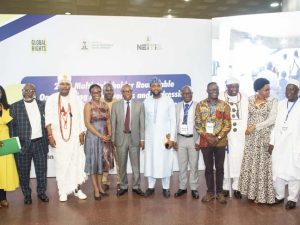With more than 80% of mining regulations not being followed, particularly by artisanal miners, Nigerian stakeholders have urged the Federal Government to declare a state of emergency in the sector to restore sanity and increase its contribution to the country’s Gross Domestic Product (GDP).

The group, which made the call in Abuja at the 2024 Multi-stakeholder Roundtable organised by Global Rights in collaboration with the Ministry of Solid Minerals and the Nigeria Extractive Industries Transparency Initiative (NEITI), lamented that the nation’s unregulated mining activities have negatively impacted the sector, to the point where it now contributes less than one percent of GDP.
In light of this, the event’s organisers feel that expanding the conversation’s participant base will help to effectively address the problem. This idea served as the inspiration for the programme’s theme, “Enhancing Inclusiveness: An Imperative for Promoting Transparency, Accountability, and Development in Nigeria’s Extractive Industry.”
“We live with the environmental and socio-economic consequences of lax oversight,” Abiodun Baiyewu, the executive director of Global Rights, said.
Even more tragic, she added, is that while many Nigerians will suffer the aftermaths of this irresponsibility in the future, these minerals lay the way for economic growth in the countries where they are illegally transported.
As a result, the environmental rights advocate emphasised the need for inclusion in strengthening host communities’ rights, increasing transparency, and fostering a path towards sustainability.
While NEITI’s audit reports on the industry show a few drips of progress in recent years, Dr. Orji Ogbonnaya Orji, NEITI’s executive secretary, hinted that this was insufficient to make a significant difference in the economy.
In 2021, the solid minerals sector contributed 0.63 percent, of GDP, according to the latest NEITI statistics, he claims. And, given the huge potential “we have in the sector,” anyone would emphatically reject this scenario.
The low inclusion of women is another major issue he observed that needs to be addressed to accelerate growth and move the sector forward. For instance, the latest independent industry audit report conducted by NEITI in the oil, gas, and mining sectors disclosed that 56 out of 70 companies covered had a total of 19,171 employees. 15,639 (82%) were men, while 3,532 (18%) of the employees were women.
“Similarly, out of 2,325 top or high-level positions, women’s representation were less than 100,” Dr. Orji stated.
Another person who firmly feels that this issue needs a speedy solution to prevent the long-term environmental effects of natural resource exploitation on the socioeconomic development of the nation is Mr. Emmanuel Kuyole, the programme officer of the Ford Foundation.
Kuyole, who sees this setback as an opportunity for Nigeria to create green jobs, wants the conversation about transitioning from oil and gas to renewable energy to “centre on the lives of those affected by mineral extraction” to avoid a repeat of the Nigeria Delta situation.
By Nsikak Ekere, Abuja
